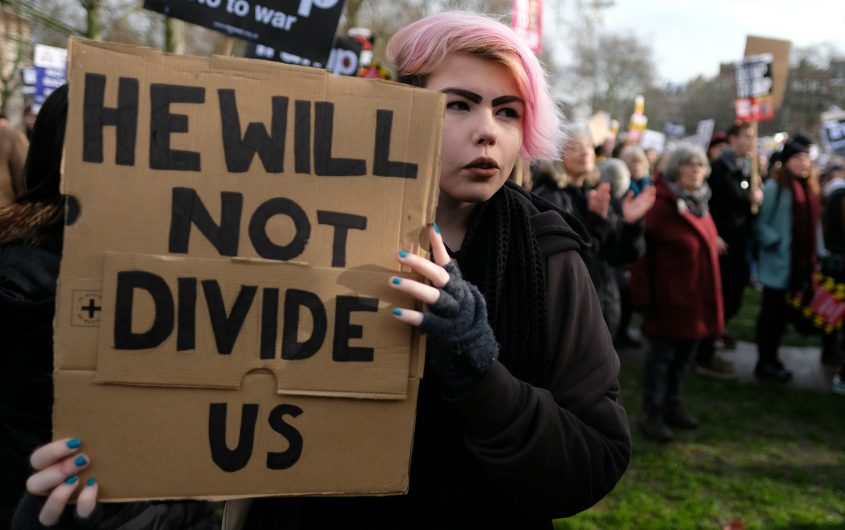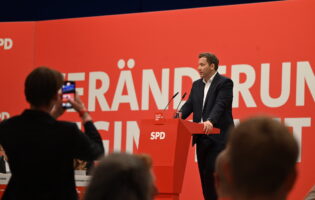
Alisdare Hickson via Flickr
“Othering” Across and Beyond the Pond

Annika Poppe
Peace Research Institute Frankfurt
Annika Elena Poppe is project director and senior researcher at the Peace Research Institute Frankfurt (PRIF). Her research focuses on international democracy promotion, U.S. foreign policy, and the global phenomenon of closing civic spaces. She is coordinator of the German research network “External Democracy Promotion,” member of the International Consortium on Closing Civic Spaces (iCon) hosted by CSIS, and has worked as a consultant for the German Development Agency (GIZ) in 2016-2017. Dr. Poppe has been trained in Political Science, American Studies (Goethe University Frankfurt/scholarship by the German National Academic Foundation), and U.S. History (American University, Washington DC/Fulbright scholarship) and she holds a PhD in Political Science (Goethe University Frankfurt). She has been a guest researcher at Georgetown University (2011), at the German Development Institute Bonn (2016), and at the Leuphana University Lunenburg (2016), and she received the Rolf Kentner Dissertation Award 2017 by the Heidelberg Center for American Studies. Recent publications include “The contested spaces of civil society in a plural world: norm contestation in the debate about restrictions on international civil society support” (Contemporary Politics 2017, with J. Wolff), “Recalibrating the interest-values-nexus. US democracy promotion in the Middle East“ (Orient 2017), and “The Nuclear Taboo, Battlestar Galactica, and the Real World. Illustrations from a Science-Fiction Universe“ (Security Dialogue 2016, with M. Fey and C. Rauch).
She is a 2018-2019 participant in AICGS’ project “A German-American Dialogue of the Next Generation: Global Responsibility, Joint Engagement,” sponsored by the Transatlantik-Programm der Bundesrepublik Deutschland aus Mitteln des European Recovery Program (ERP) des Bundesministeriums für Wirtschaft und Energie (BMWi).
During a recent discussion about the problematic state of the transatlantic relationship, someone explained that we needed to realize that important parts of the American political establishment and their voters were currently “anti-European.” Someone else wondered whether we should, in order to improve the transatlantic relationship, not refocus our efforts on finding a new common “enemy”— China being the obvious candidate. Both considerations gave me pause. What might “anti-European” actually refer to? And, while not implausible, the idea of consciously creating an “enemy” struck an uneasy chord. The discussion was a timely reminder that, of course, employing vague “anti-something” concepts and the creation of enemies serves a very important purpose—one that we should be aware of particularly in these difficult times.
So, let’s talk about our inclination to employ “othering”—and what it means for the current transatlantic relationship.
The function of “othering” has always at least as much to do with creating and affirming one’s own identity as with ascribing an identity to others.
“Othering” is a constituent part of the human condition. It describes the process of constructing “an other” that is not part of our individual self or of our group (family, community, school, soccer team, nation, etc.) by way of identifying the other with some characteristic in opposition with oneself.[1] Ascribing difference often goes hand in hand with ascribing inferiority and thus with the feeling of one’s own superiority. Subsequently, the function of “othering” has always at least as much to do with creating and affirming one’s own identity as with ascribing an identity to others. Neuroscientists tell us that “othering” comes natural to us, that we need it for developing our individual as well as social identity. Biologically we are programmed to use categorization and simplification of our environment in order to make sense of the world around us—and the tendency to divide the world into “us” and “them” is hardwired into our brain. While it is thus to some extent a necessary component of the human condition, “othering” has been cause and effect in human conflicts since the beginning of mankind.
“Othering” has been well-researched by a wide range of academic fields, among them the neurosciences, psychology, anthropology, and the social sciences. But since it comes so naturally to us, we often lack awareness of it.[2] And it bears reminding ourselves that it is an increasingly active mechanism in how we think about and conceptualize our relationship with the other side of the Atlantic as well. The transatlantic relationship of the past decades with its strong focus and basis in the perception of common values and interests has been predominantly characterized by an in-group generating impetus which mostly prevailed over “othering” tendencies and many disagreements. This was the case not least because the (re)affirmation of “us” was (also) conceived of in opposition to a commonly shared “other,” such as communist countries during the Cold War. While this in-group generating impetus might still prevail, the increasing deterioration of the relationship shows that it has begun to weaken.
Both sides of the Atlantic currently suffer from populist movements that have successfully exploited the human inclination to “othering” for the purpose of marginalizing and vilifying entire groups and populations and have, in doing so, increased their political power to an extent that might endanger our democratic systems.
Now, being conscious of mechanisms of “othering” is not going to solve any issues in the transatlantic relationship. But it might very well take the edge off of some of them and prevent a further and needless deepening of existing rifts. It can help us put the problems we have into perspective; realize where divergence has been (sometimes deliberately) exacerbated, obstructing resolution attempts; and see where there are substantial disagreements that we do need to address. Clichés about each other provide a convenient comfort zone, particularly for explaining relationship tensions and for feeling “right” about one’s own position. But it is important to move beyond these notions and focus on what we (still) have in common and care about—and to focus on those shared problems whose solutions would benefit from cooperation. To name but one: both sides of the Atlantic currently suffer from populist movements that have successfully exploited the human inclination to “othering” for the purpose of marginalizing and vilifying entire groups and populations and have, in doing so, increased their political power to an extent that might endanger our democratic systems. What can we learn from each other in terms of successfully unmasking these movements for what they are?
While understanding the phenomenon of “othering” is analytically important, let us try to avoid employing it as a tool ourselves—even for, ostensibly, good purpose. We need to develop a new and compelling narrative of why the transatlantic relationship is an important one to both sides of the Atlantic. But let us be careful in choosing our language and in creating this narrative—and not fall prey to the lure of intentionally overstating characterizations of differences to other parts of the world to create our own “rally-around-the-transatlantic-flag” effect. We cannot rid ourselves of “othering” tendencies entirely, but let us attempt to focus more on our own values that bind us together and to focus on joint challenges instead of creating joint enemies.
As David Brooks recently reminded us: “This trans-Atlantic partnership was a vast historical accomplishment, a stumbling and imperfect effort to extend democracy, extend rights, extend freedom and build a world ordered by justice and not force. Since 1945 it is the thing we have all taken for granted.” Stumbles, imperfections, and many disagreements across the pond indeed. But, notably, our societies were built on the shared ideas of democracy, human rights, the rule of law, tolerance, and political equality. We continue to share these and we currently share the experience of seeing these values eroding from within as well as being questioned from without. Certainly, there is more than enough common ground to (re)embrace and work from. While the transatlantic community may have come into being and thrived in opposition to common enemies, let us hope that we will be able to show that the relationship stands strong enough on its own.
[1] See, for example, Lila Abu-Lughod, “Writing Against Culture,” in Recapturing Anthropology: Working in the Present, ed. R.G. Fox (Santa Fe, NM: School of American Research Press, 1991), 137-162; Lajos Brons, “Othering, an Analysis,” Transience 6:1 (2015).
[2] How to overcome this lack of awareness by extending the boundaries of one’s in-group and thus consciously including “the other” has been a concern to very diverse thought schools, ranging from economics (see Adam Smith’s Theory of Moral Sentiments, 1759) to spiritual and religious traditions (such as Buddhist mettā practices).









